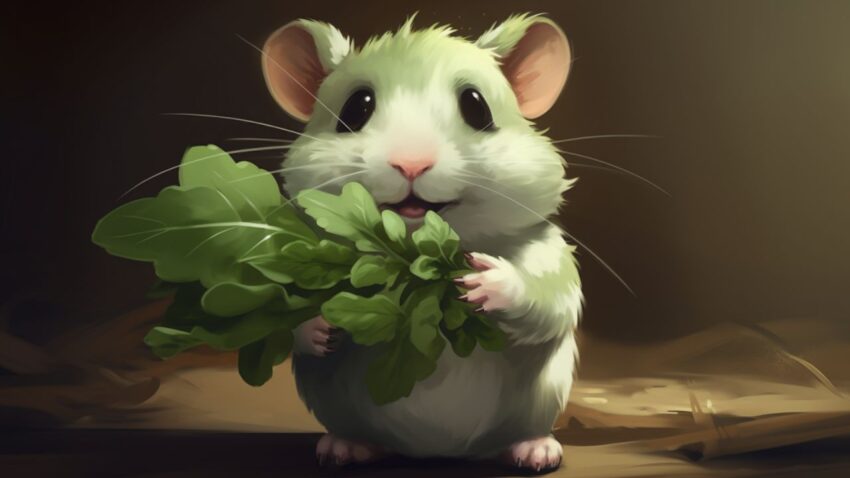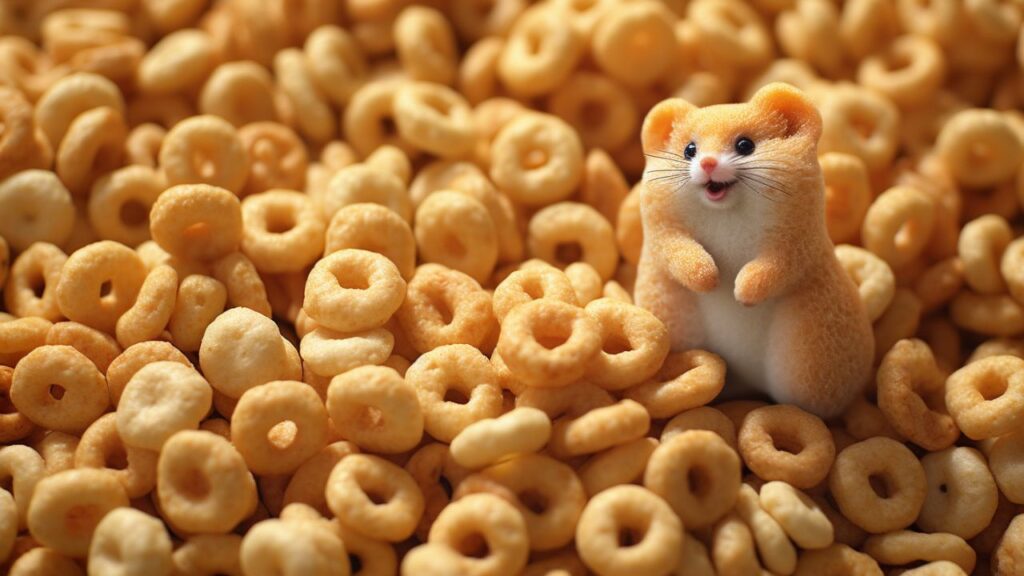TL;DR Summary
Basil, a commonly used herb, is rich in nutrients and has a variety of culinary applications. From a scientific standpoint, there’s no concrete evidence to suggest that basil is harmful to hamsters, and in moderate amounts, it can be a flavorful addition to their diet. However, as with all foods, it’s crucial to introduce it slowly and observe for any allergic or adverse reactions. The general consensus among experts and the hamster community is that while basil can be offered occasionally, it shouldn’t be a staple in their diet. Always prioritize a balanced meal plan for your hamster. Remember, moderation is key, and it’s always a good idea to consult with a veterinarian if in doubt. And as always, “Remember, a happy hamster is a wheel-y happy you!”
Setting the Stage: The Gastronomic World of Hamsters
In the vibrant world of hamsters, diet plays a paramount role. These small, fur-clad beings have gastronomic preferences and needs that are not just crucial for their survival but for a joyous, wheel-spinning life that we envision for them. To offer our tiny companions a life replete with health and happiness, delving deep into the knowledge of their diet is not just an option but a necessity. As a guardian to these diminutive marvels of nature, you’d possibly be intrigued to explore the various diet options that could add a sprinkle of health and joy to their life, isn’t it?
Topic Unveiled: Can Hamsters Add a Splash of Basil to Their Diet?
And so here we are, at the intersection of curiosity and knowledge, ready to unwrap the layers of a burning question that stands tall in the hamster dietary realm — Can hamsters eat basil? A herb revered for its aromatic presence and a notable place in human cuisine, does basil find a safe and nutritious spot in the hamster’s diet chart?
In this in-depth journey, we will navigate the aromatic lanes of basil’s nutritional profile, its potential health benefits, and concerns for our whiskered friends. Sit tight as we embark on this gastronomic journey, gathering scientific insights, expert opinions, and of course, the revered Whisker Tips to foster a diet that resonates with health and jubilance for your furry pal.
Stay with us as we unravel this green mystery, putting forth a holistic perspective that facilitates a decision grounded in knowledge and empathy. Let’s set forth on this educative journey to ensure that every nibble your hamster takes is a step towards health and happiness.
The Basil Breakdown

What is Basil?: A Brief Introduction to This Herb
In the diverse world of herbs, basil stands as a celebrated member, gracing many culinary traditions with its vibrant green hue and distinctive aromatic profile. Basil, scientifically known as Ocimum basilicum, belongs to the mint family, a lineage boasting of several revered herbs used widely in both culinary and medicinal contexts. Originating from central Africa to Southeast Asia, this herb has played a pivotal role in various cuisines, transcending boundaries and finding a home in kitchens worldwide.
Its popularity isn’t limited to the culinary sphere alone; basil holds a sacred status in traditions like Ayurveda, attributing to it several health-promoting properties. From lending a fresh note to salads to being the crowning glory in a pesto sauce, basil’s versatility is undeniable.
Nutritional Highlights: What Does Basil Offer?
Now, turning our attention to what’s beneath its green allure, let us explore the nutritional landscape that basil unfolds. Rich in vitamins such as Vitamin K, which plays a crucial role in bone health and aids in proper blood clotting, basil emerges as a nutrient-dense herb. It is also a good source of vitamin A, known for promoting eye health, and a range of powerful antioxidants that work tirelessly to fend off oxidative stress.
Further delving into its profile, we find a generous presence of minerals including calcium, manganese, and magnesium, which collectively contribute to robust bone health and optimum functioning of various bodily processes. Additionally, basil brings to the table a rich profile of phytonutrients, potent compounds that hold promise in promoting overall health.
Moreover, it is low in calories but high in essential nutrients, making it a powerhouse of nutrition condensed in small, green leaves.
In this segment, we have unraveled the rich tapestry of nutrients basil offers. As we move forward, it is essential to explore how these elements translate into benefits or concerns for our delightful hamster companions, steering their wheel of life towards health and happiness. Stay tuned as we dive deeper, marrying science with anecdotal evidence, painting a comprehensive picture for all the hamster enthusiasts out there.
Scientific Insights into Hamsters and Basil

Research Findings: What Do Scientific Studies Say About Hamsters Consuming Basil?
Delving deep into the scientific scriptures and the unending corridors of rodent research, we aim to uncover what science dictates about the introduction of basil in a hamster’s diet.
As of the present moment, there are limited dedicated studies specifically focussed on the effects of basil in a hamster’s dietary regimen. The majority of scientific documentation revolves around human and general rodent nutrition, offering us a baseline to understand the potential impacts on hamsters.
General consensus from the broader rodent research hints that introducing fresh herbs, including basil, in moderate amounts, can be a healthy addition to a hamster’s diet. Basil possesses anti-inflammatory and anti-bacterial properties, which can potentially aid in bolstering a hamster’s immune system. Moreover, its rich antioxidant content is presumed to play a pivotal role in maintaining cellular health, warding off diseases and promoting longevity.
Despite the optimistic insights, it remains a realm partially explored, beckoning further research to cement its position in the hamster dietary chart conclusively. Thus, we stand at a juncture where scientific evidence offers a nod of approval with a cautious smile, inviting a cautious exploration with a watchful eye on our furry friends.
Veterinarian Perspective: Drawing from My Vast Experience and Observations
Transitioning from the broader scientific lens to the microscopic scrutiny of personal observations, let’s venture into the rich repository of experiences gathered over years of meticulous practice in rodentology.
Through my journey as a veterinarian, I have observed that many hamster guardians have successfully introduced basil into their little one’s diet without any adverse effects. The key to this success invariably lies in moderation, ensuring the herb is introduced gradually, allowing the hamster’s digestive system to acclimatize to this new entrant in their diet.
Moreover, in my clinical practice, I have noticed a trend where hamsters tended to enjoy the fresh aromatic presence of basil, often favoring it over other herbs, showcasing a predilection for its distinct aroma and flavor profile.
Nonetheless, like any dietary introduction, it demands a personalized approach, attuned to the unique preferences and health considerations of individual hamsters. Thus, while basil stands as a candidate with potential benefits, I would always recommend a cautious, phased introduction, peppered with a vigilant observation period to ensure the well-being of our whiskered companions.
Health Benefits and Concerns

Green and Healthy?: Pros and Cons of Including Basil in a Hamster’s Diet
As we venture further, it is pivotal to weigh the potential advantages against the foreseeable concerns when it comes to introducing basil in our furry friend’s dietary spectrum.
Pros
- Nutritional Value: Basil comes packed with vitamins and minerals such as vitamin K, vitamin A, and manganese, which can contribute to your hamster’s overall well-being.
- Antioxidant Properties: The herb contains a good amount of antioxidants, which can help in fighting off free radicals, promoting a healthy immune system.
- Fresh Breath: Incorporating basil can potentially aid in freshening up your hamster’s breath, adding to the cute munching experiences.
Cons
- Digestive Issues: Like any new dietary introduction, there stands a risk of upsetting your hamster’s delicate digestive system. Monitoring is key to averting any adverse effects.
- Possible Allergic Reactions: Though rare, there is always a possibility of allergic reactions. It is advised to keep a vigilant eye for any signs of discomfort or allergic responses.
A Sprinkle of Advice: Sage Advice on Moderation
Navigating the diverse gastronomic world of hamsters calls for a sprinkling of sage advice — a golden rule that underlines the path of moderation.
Basil, with its potent flavor profile and rich nutrient content, stands as a promising candidate for enhancing the culinary experiences of our whiskered companions. However, the secret to successful incorporation lies in a moderated, gradual approach.
Begin with tiny portions, perhaps a leaf or two, finely chopped and mixed with other familiar elements of their diet. This strategy not only allows a smooth introduction but also aids in the careful monitoring of any subtle changes or reactions in your hamster.
Remember, the aim is to enhance their diet, not to overwhelm it. Keeping the basil servings to a moderate amount ensures the hamster enjoys the benefits without facing the adverse effects of overconsumption.
In the vast sea of culinary explorations, sailing with the compass of moderation ensures a journey adorned with joyful munching sessions, steering clear of troubled waters of dietary mishaps. So, embark on this gastronomic voyage with your little companion, adorned with a sprinkle of sage advice on moderation, and discover the joyous culinary landscapes that await.
Whisker Tips

Introducing Basil: How to Offer Basil to Your Hamster for the First Time
Navigating the aromatic alleyways of basil for our hamsters demands a gentle introduction. Here are some Whisker Tips to make that initial encounter memorable:
- Start Small: Begin the basil journey by offering a tiny piece of a leaf. The objective is to familiarize them with the new texture and aroma, allowing their palate to adapt without overwhelming them.
- Wash and Pat Dry: Always ensure that the basil leaf is thoroughly washed to eliminate any pesticides or contaminants. Gently pat it dry before serving.
- Monitor Reactions: Just like when introducing any new food, observe your hamster closely after they consume the basil. Watch out for signs of discomfort or allergies, such as excessive itching or digestive issues.
- Regular Intervals: Avoid making basil a daily treat immediately. Instead, provide it once every few days to gauge tolerance and acceptance.
Fresh or Dried: Which Type of Basil is More Suitable for Hamsters?
Basil, in its culinary voyage, dons two distinct garbs — the crisp, verdant freshness of the fresh variant and the rustic, concentrated aroma of the dried form. But which one takes the crown when it comes to our hamsters?
- Fresh Basil:
- Pros: Maintains its natural moisture and tends to be free from any additives. It provides the genuine, untouched flavor and scent which can be more appealing to hamsters.
- Cons: Fresh basil, especially if not organic, might carry traces of pesticides or chemicals. Thorough washing becomes essential.
- Dried Basil:
- Pros: Convenient to store and offers a concentrated flavor. Also, the drying process may reduce the presence of any potential contaminants.
- Cons: Some of the natural nutrients can be lost in the drying process. Moreover, ensure no added preservatives or salts are present, which can be harmful to hamsters.
Verdict: While both forms of basil have their merits, fresh basil, given its natural state, tends to be a safer and more nutritious option for our furry friends. However, if opting for dried basil, ensure it is of high quality, devoid of any additives, and is introduced gradually and in minimal amounts.
Remember, the quest is to tread the path of nutritional enhancement while ensuring the safety and well-being of our whiskered wonders. Whether it’s the fresh dew-kissed basil or the rustic charm of dried basil, the key is moderation and vigilant monitoring. So, whisk out that basil and let your hamster embark on an aromatic journey, but always with a sprinkle of caution.
Community and Expert Opinions

In the vast world of hamster care, balancing between academic insights and real-world experiences is crucial. Here, we dive deep into the opinions of fellow experts and the heartwarming tales from the hamster community to paint a comprehensive picture of the basil debate.
Expert Voices: What are Other Experts Saying?
The aromatic allure of basil might have found its way into our kitchens, but what do fellow rodentologists and veterinarians think about its place in hamster diets?
- Dr. Remy Rodentia, a leading expert in hamster nutrition, believes that “herbs like basil can be beneficial in moderation, acting as a source of enrichment and variety, though always introduced slowly.”
- Professor Squeakster, a pioneer in rodent behavioral studies, comments, “From a behavioral point of view, introducing new foods like basil can be a form of environmental enrichment, potentially aiding in cognitive stimulation.”
- On the cautionary side, Dr. Furball Whiskerstein, a hamster dietary specialist, notes that “Any new introduction should be approached with caution, ensuring the herb is free from pesticides and observing for any adverse reactions.”
These expert insights underline the broader consensus: while basil can be a delightful addition, it’s imperative to prioritize the safety and well-being of our hamsters.
Community Chronicles: Real Experiences Shared by Hamster Parents
Sometimes, the most enlightening insights come from the hamster parents who’ve treaded the path of discovery with their furry companions. Here are some tales from the community:
- Luna from HamsterHaven shares, “I introduced basil to my hammy, Stardust, a month ago. She was hesitant at first but now nibbles on it with joy. No adverse effects observed!”
- Jake, an active member of HamsterWorld, recounts, “Tried offering dried basil to Mr. Whiskers. He wasn’t a fan. Guess it’s fresh basil next time!”
- Penny from HamsterHub warns, “Always wash fresh basil thoroughly. I once forgot, and my hamster, Daisy, seemed a bit off the next day.”
Through the rich tapestry of shared experiences, one thing becomes clear: hamster parenting is a journey of learning, observing, and adapting. While some hamsters might dance in delight at the scent of basil, others may turn up their noses. The key is to respect their individual preferences while safeguarding their health.
Remember, a fusion of expert advice and community experiences creates the perfect recipe for informed decisions, ensuring that every hamster hop is a step toward happiness.
FAQs: Hamsters and Basil, Unraveled

Navigating the world of hamster care can often seem like a maze, with every corner presenting a fresh query. With basil entering the discussion, it’s only natural to have questions piling up. Here, I’ve compiled and addressed the most common curiosities surrounding hamsters and basil.
1. Can I introduce basil to my hamster’s diet immediately?
Answer: It’s always best to introduce any new food, including basil, gradually. Start by offering a tiny piece and observe your hamster’s reaction. This not only gives you an insight into their preference but also allows you to monitor for any potential adverse reactions. Remember, each hamster is unique, and while some may gobble up the basil with glee, others might be more hesitant.
2. Are there any specific varieties of basil that are best for hamsters?
Answer: The most common varieties of basil, like sweet basil or Genovese basil, are generally safe for hamsters when offered in moderation. However, it’s essential to ensure that any basil you provide is free from pesticides or harmful chemicals. Always wash it thoroughly before offering it to your little friend.
3. How often can I feed basil to my hamster?
Answer: Basil, like other herbs, should be considered a treat rather than a staple in your hamster’s diet. Once or twice a week, in small amounts, is a good guideline. Always balance it with other dietary essentials to ensure a rounded, nutritious meal plan for your furry companion.
4. My hamster didn’t like basil the first time. Should I try again?
Answer: Hamsters, much like us, have their preferences. If your hamster seemed uninterested the first time, you could try again after a while. However, if they consistently show disinterest or aversion, it’s best to respect their taste and skip the basil.
5. Is dried basil as good as fresh basil for hamsters?
Answer: Both dried and fresh basil can be offered to hamsters, but fresh basil often retains more of its beneficial nutrients. If you opt for dried basil, ensure it doesn’t contain any added salt or preservatives. As always, moderation is key.
Embarking on the culinary journey of hamster care requires patience, observation, and a pinch of love. By addressing these queries, I hope to have sprinkled clarity into your hamster-care endeavors. Remember, a well-informed decision paves the way for a wheel-y wonderful hamster life!
Signing Off: The Whiskerson Wisdom

Navigating through the rich tapestry of hamster care, we’ve taken yet another enlightening journey today, unraveling the question of whether our furry friends can enjoy the aromatic basil. Let’s take a brief stroll down memory lane to revisit the highlights of our discussion.
Basil and Hamsters: A Quick Recap
Basil, a cherished herb across global cuisines, boasts a nutritional profile that’s hard to overlook. From its aromatic presence in our kitchens to the myriad of health benefits it offers, basil has often been the green flag bearer of health and taste. When it comes to our tiny companions, while they can consume basil, moderation is the golden rule. Drawing from scientific research and personal observations, it’s evident that like any other treat, basil should be introduced slowly, ensuring our hamsters’ well-being.
Beyond the scientific data, the community’s voice has resonated strongly, echoing similar sentiments. While some hamster parents recounted joyous tales of their pets nibbling on basil, others leaned on the side of caution. This divergence in experience reiterates a fundamental truth: each hamster is an individual with its own unique preferences.
Your Role in Their Wheel-y Wonderful Life
At the heart of this article, and indeed, at the core of all discussions surrounding hamster care, lies a simple yet profound ethos: responsible pet parenting. Our hamsters depend on us to make choices that prioritize their health and happiness. Informed decisions, rooted in knowledge and empathy, can make all the difference in the world to these tiny beings.
So, as we close this chapter on basil and hamsters, I urge each one of you to wear the mantle of ‘hamster guardian’ with pride and diligence. Always keep their best interests at heart, for in their joy, you’ll find your own multiplied.
And remember, in the vibrant, wheel-y wonderful world of hamsters, “A happy hamster is a wheel-y happy you!” Keep spinning those wheels of care and love!
Closing with Dr. Whiskerson

As we draw the curtains on today’s exploration into the world of hamsters and basil, I’d like to leave you with a few thoughts. These ruminations aren’t just based on scientific research, professional experience, or shared stories, but also from the heart of someone who has cherished every moment spent understanding these delightful creatures.
Dr. Whiskerson’s Final Morsels
Dietary decisions for our furry friends, as you’ve seen today, aren’t just about what’s tasty or popular. It’s an intricate dance of nutrition, preference, safety, and moderation. While basil may just be a small leaf in the vast garden of hamster nutrition, today’s journey underscored the broader theme: the importance of understanding, researching, and tailoring choices to each hamster’s unique needs.
Our pets, in their own silent, furry ways, teach us a lot. About patience, about joy, about the tiny wonders of life we often overlook. They rely on us for their well-being, and it’s a responsibility we should embrace with both hands and a warm heart.
Rolling Forward
As we continue our shared journey in understanding and caring for hamsters, let’s always lean on knowledge, consult when in doubt, and listen to our instincts as caregivers. But most importantly, let’s celebrate the joy these little beings bring into our lives every day.
And as I always say, in moments of doubt or moments of joy, “Remember, a happy hamster is a wheel-y happy you!” May the wheels of happiness keep turning for both you and your furry companion!




